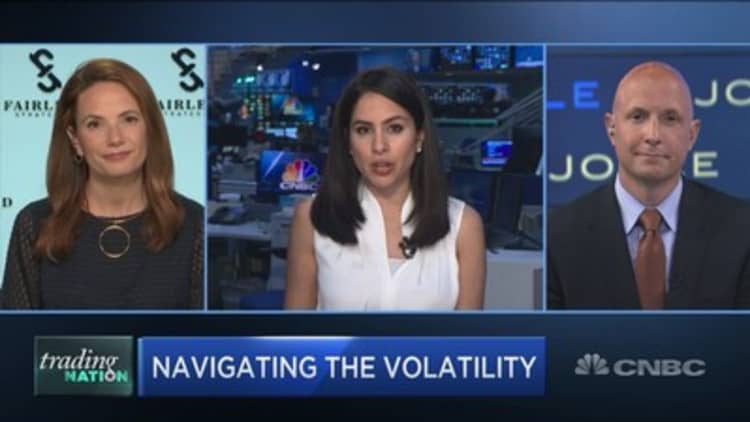
Low-beta beacons are in focus.
As stocks come off their worst trading day since the 1991, investors may be interested in finding low-beta stocks — names that are less affected by market volatility — to help cushion their portfolio in times of market turmoil.
Here are some of the lowest-beta stocks in the S&P 500:
- Dollar Tree, with a beta of 0;
- Autozone, with a beta of 0.07;
- Tiffany & Co., with a beta of 0.13;
- Clorox, with a beta of 0.31;
- Allergan, with a beta of 0.45.
But buyers should tread carefully with low-beta plays, even though they tend to have lower risk profiles relative to other equities, market commentators told CNBC's "Trading Nation" on Monday.
"I probably wouldn't be that inclined to use individual stocks as market hedges at this time," said Katie Stockton, founder and managing partner of Fairlead Strategies. "I think it's such a top-down-oriented move that one might be better served by using something like a low-beta ETF, something that has broader exposure, diversified exposure, as opposed to one individual name."
Of all the aforementioned names, Stockton did acknowledge that one had a particularly strong technical picture: bleach-maker Clorox.
"Clorox does stand out to me from a technical perspective as having some upside potential," she said, referencing its chart. Clorox closed at $174.90 on Monday, up nearly 1%, after reaching a new 52-week high earlier in the session.
"We have a breakout on the chart — and, of course, that's for news-related items — and that breakout has already seen some follow-through. It's from a long-term trading range that could target higher prices just from a momentum perspective," Stockton said. "So, that breakout is encouraging, especially in the weak tape."
Stockton added that Clorox's relative strength, or performance vis-a-vis benchmarks like the S&P, "has certainly improved."
"You can see it in the ratios, and they have reversed the downtrend that characterized Clorox versus the broader market last year," she said. "So, I do indeed think that that has staying power."
Quint Tatro, founder and chief investment officer of Joule Financial, wasn't a fan of any of the above names.
"Just because something isn't working in one area, then moving over and shifting very quickly into an area that might be working like staples and getting after these names for so-called protection" isn't necessarily a sound strategy, he warned.
"I would actually be shifting more towards the names that are beaten up here, but are providing exceptional yield, especially in this now-ridiculous interest rate environment," he said.
The yield on the benchmark U.S. 10-year Treasury fell to a record low on Monday before recovering somewhat. It rose to 0.633% on Tuesday morning.
In particular, Tatro liked the utilities sector, specifically the stock of electric-power company Duke Energy.
"Duke has an exceptional balance sheet [and is] now yielding almost 4%," Tatro said. "This is a name that we don't feel we have to be concerned about cash flow, being able to pay the dividend, and a utility that is getting beaten up here, we think, through some forced selling. So, instead of, again, chasing some of the staples here for defensive positions, we're trying to look at some of the utilities that we already favor, but would still be buying in this range."
Duke Energy was up 2% in Tuesday's premarket, a day after falling more than 4.5% to close at $94.58.
Disclosure: Joule Financial and Tatro own shares of Duke Energy.







